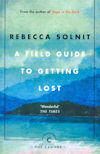In her iconic essay ‘Men Explain Things to Me’, Rebecca Solnit
investigates the conversations of men who wrongly assume they know things and wrongly assume women don’t.
This famous and influential essay is included here along with the best of Solnit’s feminist writings.
From rape culture to grandmothers, from French sex scandals to marriage and the nuclear family,
and from Virginia Woolf to colonialism, these essays are a fierce and incisive exploration
of the issues that a patriarchal culture will not necessarily acknowledge as ‘issues’ at all.
With grace and energy, and in the most exquisite and inviting prose,
Rebecca Solnit proves herself a vital leading figure of the feminist movement and a radical, generous thinker.
The first essay in this little book starts with the now-famous anecdote:
[pp2–4]
… I began to speak only of the most recent on that summer day in 2003,
River of Shadows: Eadweard Muybridge and the Technological Wild West,
my book on the annihilation of time and space and the industrialization of everyday life.
He cut me off soon after I mentioned Muybridge.
“And have you heard about the very important Muybridge book that came out this year?”
So caught up was I in my assigned role as ingénue that I was perfectly willing to entertain the possibility
that another book on the same subject had come out simultaneously and I’d somehow missed it.
He was already telling me about the very important book—with that smug look I know so well in a man holding forth,
eyes fixed on the fuzzy far horizon of his own authority.
Here, let me just say that my life is well-sprinkled with lovely men, …
Still, there are these other men, too.
So, Mr. Very Important was going on smugly about this book I should have known when Sallie interrupted him to say,
“That’s her book.” Or tried to interrupt him anyway.
But he just continued on his way. She had to say, “That’s her book” three or four times
before he finally took it in. And then, as if in a nineteenth-century novel, he went ashen.
That I was indeed the author of the very important book it turned out he hadn’t read,
just read about in the New York Times Book Review a few months earlier,
so confused the neat categories into which his world was sorted that he was stunned speechless—for a moment,
before he began holding forth again.
The term “mansplaining” was subsequently invented by another author,
and so we now have a name with which to skewer this kind of behaviour.
After the light-hearted tone used for telling this anecdote
(albeit with more than a hint of gritted teeth),
the essay rapidly gets darker and more serious.
The whole book is a short series of essays covering various aspects of patriarchy:
from mansplaining, to rape culture;
from why same sex marriage equality does
indeed threaten “traditional”, that is, grossly unequal, marriage,
to the obliteration of women's voices;
from arguing with Susan Sontag arguing with Virginia Woolf,
to the history of women's movement.
All this is beautifully written with verve, and passion, and rage,
and makes for excellent, but uncomfortable, reading.


